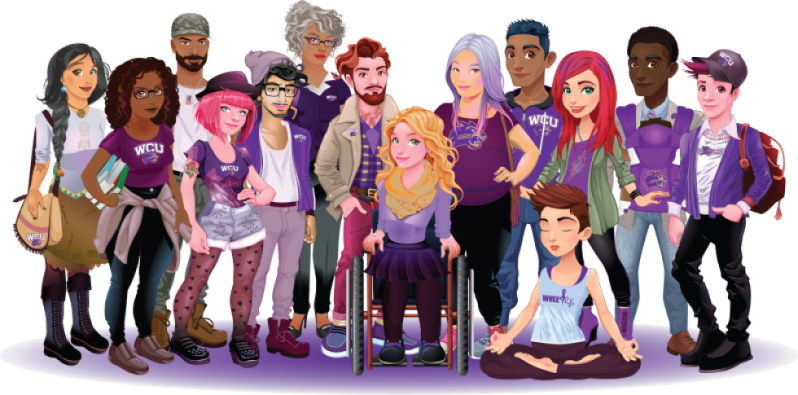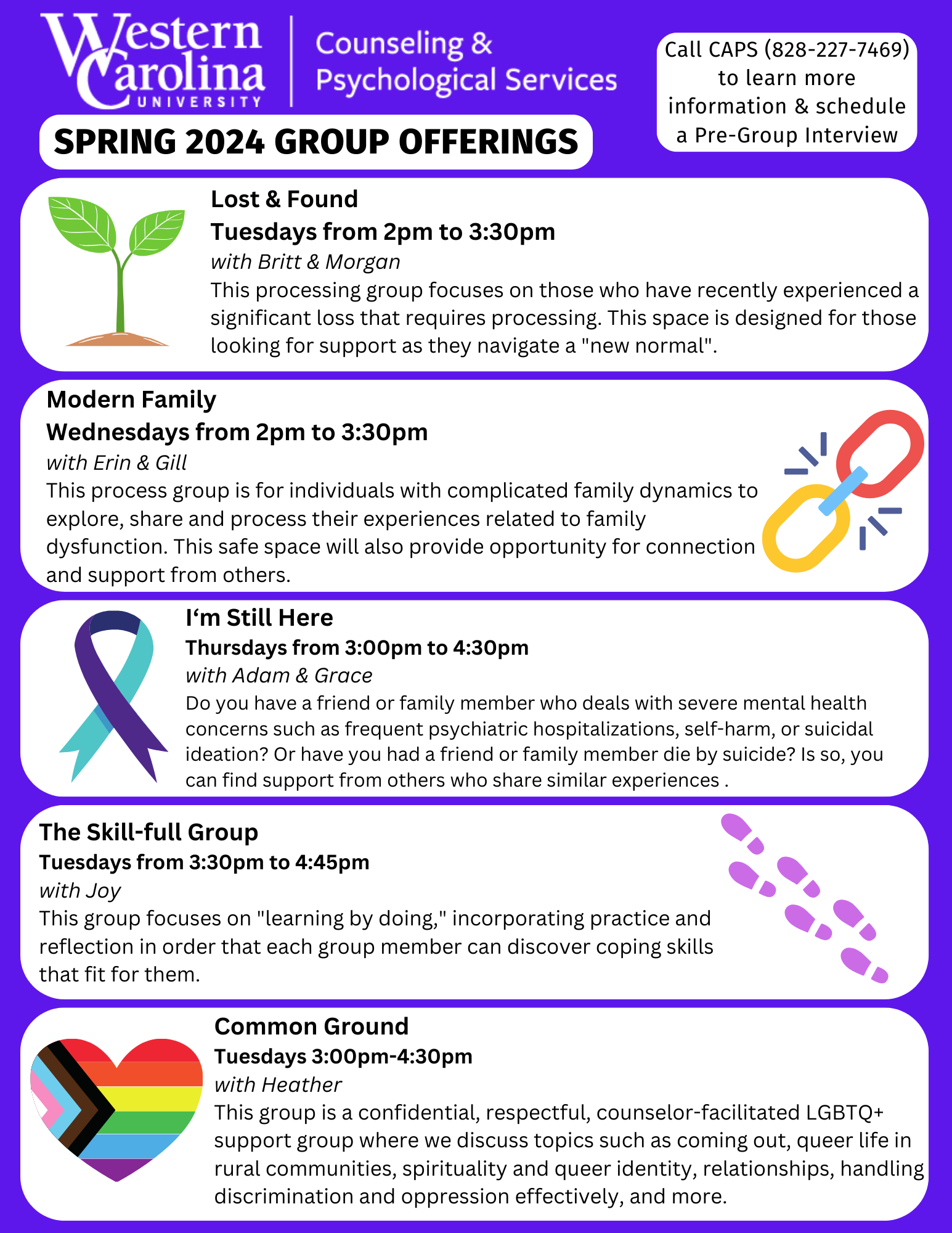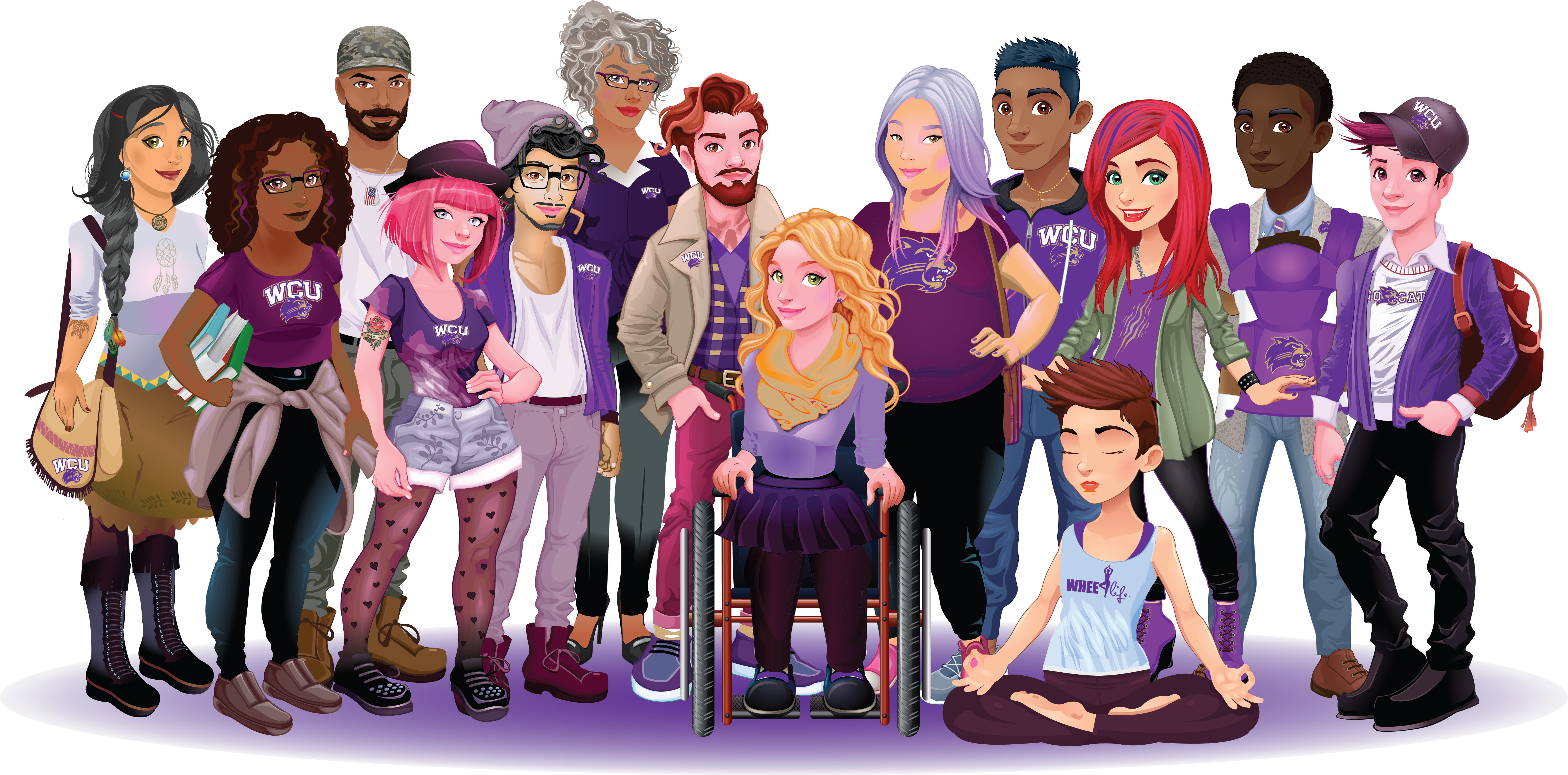- Student Life & Services
- Health and Wellness
- Counseling and Psychological Services
Counseling & Psychological Services
To make an appointment:
Please contact the main office at 828.227.7469 during normal business hours (Monday through Friday, 8am to 5pm).
Crisis Care
- Mon-Fri 8am to 5pm: 828.227.7469
- After hours and weekend: 828.227.7469 and follow the prompts
- Western NC 24 hour crisis line: 888.315.2880
- Suicide Prevention Lifeline: 800.273.8255
Explore Self Help and
Wellness Tools for Students
About CAPS

CAPS' staff provide counseling services to WCU students. Some of the frequent concerns that students have include:
- Anxiety and depression, which includes symptoms of suicidality, loneliness, and low self-esteem
- Grief
- Relationship concerns, which could include friends, roommates, romantic partners, and family
- Concerns related to experiences of trauma, sexual assault, or abuse
- Identity concerns (that is, figuring out who they are)
- Body image problems and/or eating concerns
- Beginning or maintaining recovery from addictive substances or behaviors
While these are the primary reasons that students seek counseling, please know that any concern or struggle you have can be addressed in counseling.
Watch our video to learn more about CAPS and our services.
CAPS services video transcription
Our Staff
Our staff includes licensed providers who have years of experience in working with the university student population.
They are committed to helping students to achieve their personal and academic goals and to enhance their experience while at WCU.
CAPS Services
CAPS has a strong commitment to meeting the needs of our diverse students by providing high quality, culturally sensitive services. We strive to create a welcoming environment for all people.
Individual
The CAPS staff all provide individual counseling that is aimed at helping you to remove any barriers to your academic, social and/or personal life. Your individual counselor will take some time to get to know you and your specific goals for counseling. You will discuss how often you will meet, recognizing that the focus is on achieving these goals within a brief time period.
Crisis Services
CAPS' staff are available to assist students who are experiencing a mental health crisis at any time of the day. During regular business hours (8:00 a.m. to 5:00 p.m., Monday through Friday), call the CAPS' main line (828.227.7469) or come in CAPS and you will be seen in a timely manner.
For after-hours emergencies, call the CAPS main line (828.227.7469) and follow the prompts to be connected to a crisis clinician. You may also contact the community crisis line through Appalachian Community Services (888.315.2880) or go to the nearest emergency room for assistance.
Group
Research shows that group therapy is the most effective treatment for many of the
concerns college students face. Because of this, your counselor may refer you to one
of several groups offered by CAPS.
Here is what students say about our groups:
"DO IT! Or at least try it because it is really helpful and really becomes a comfortable
space to talk about things you wouldn't talk about with people in your everyday life."
"It is a great way to connect with people who understand what you are going through."

Spring 2024 Groups
Tuesdays
Lost & Found | 2:00 - 3:30pm | Starts February 20th| with Britt and Morgan
This is a general processing group that contains individuals who have experienced
a significant loss that requires processing (i.e.: family loss, reproductive loss,
displacement). This space is designed for those looking for support as they navigate
a "new normal".
The Skill-full Group | 3:30 - 4:45pm | Starts February 20th | with Joy
This group focuses on "learning by doing," incorporating practice and reflection in
order that each individual group member can discover skills that fit for them.
Common Ground LGBTQ+ Support Space | 3:00-4:30pm | with Heather
This group is confidential, respectful, counselor-facilitated LGBTQ+ support group
where we discuss topics such as coming out, queer life in rural communities, spirituality
and queer identity, relationships, handling discrimination and oppression effectively,
and more.
Wednesdays
Modern Family | 2:00-3:30pm | with Erin and Gill
This process group is for individuals with complicated family dynamics to explore, share, and process their experiences related to family dysfunction. This safe space will also provide opportunity for connection and support from others.
Thursdays
I'm Still Here | 3:00 - 4:30pm | with Adam and Grace
Do you have a friend or family member who deals with severe mental health concerns
such as frequent psychiatric hospitalizations, self-harm, or suicidal ideation? Or
have you had a friend or family member die by suicide? If so, you can find support
from others who share similar experiences within the "I'm Still Here" group.
The Case Manager is dedicated to helping you find and connect with services and resources in the community. The Case Manager can help you identify community resources for food, clothing, social services and financial assistance. Additionally, the case manager can assist you in connecting with an off-campus mental health provider if you are having difficulty in doing so. Students are referred to the Case Manager by the CAPS’ clinicians. You can use our Resource Guide to identify supports that meet your needs. The Spirituality Resources document provides information to help you connect with organizations and communities in the western North Carolina area.
CAPS’ outreach programs are designed to promote prevention, awareness and skill development among the Catamount community. Through our outreach programming and workshops, CAPS connects to students, faculty, and staff as they partner with us in reducing stigma around mental health concerns. Our goal with outreach is that participants will develop new knowledge and tools to help them remove barriers to their success at WCU.
TELEMENTAL HEALTH SERVICES (TMH)
- CAPS offers both in-person sessions and sessions via Zoom. However, since TMH may not be as complete as in-person services, your counselor may determine that TMH is not an appropriate treatment option or stop TMH at any time if your condition changes. In such cases we will ethically manage transferring care as necessary.
CONFIDENTIALITY AND TELEMENTAL HEALTH
- We encourage students to schedule appointments at times when they can have a private space and use a secure internet connection. Each of our clinicians will also ensure privacy on their end, often in their office at CAPS, and at other times in private rooms in their home. Your clinician may use a headset to help ensure privacy and we encourage you to do the same.
- CAPS uses a HIPAA compliant version of Zoom for all of our video TMH appointments.
- CAPS will provide you a unique Zoom link for each session. Do not share this link with anyone.
TECHNOLOGY DIFFICULTIES
- If you get disconnected from a TMH health session, end and restart the session. If you are unable to reconnect within five minutes, your counselor will call you at the phone number on file.
SERVICES OUTSIDE OF NORTH CAROLINA
- All students must be in North Carolina in order to receive counseling services from CAPS. If you are out of state temporarily, we encourage you to reschedule your appointment until you return to NC. If you are living outside of NC, our counselors are happy to talk with you about resources in your area.
Your CAPS counselor may refer you for a medication evaluation.
Counseling services for Biltmore Park students are offered by CAPS staff via a telemental health session or through an in-person session at the CAPS office in Cullowhee. For an appointment, call 828.227.7469.
CAPS provides services to currently enrolled WCU students.
To talk to a counselor, please call our office (828.227.7469). The office is open Monday through Friday from 8:00 a.m. to 5:00 p.m.
To begin counseling at CAPS, the first step is to meet briefly with a counselor to discuss what concerns brought you to CAPS and to arrive at a mutually agreeable course of action to address your concerns. The first meeting usually lasts 20 to 30 minutes and can be conducted over the phone. You will need to be in a safe environment with no distractions for this appointment.
Based on this meeting, your counselor will make recommendations about the best treatment to address your concerns. This may be another campus resource, our self-help resources, a short-term group, an ongoing group or individual counseling at CAPS or in the community.
Please note that when you arrive for your first meeting, there may be a wait. Know that we prioritize appointments based on urgency and counselor availaibility. We appreciate your patience and understanding.
CAPS offers university counseling center training positions at both the master's and doctoral level. In addition to becoming strong mental health generalists in the provision of individual counseling services, trainees have the opportunity to participate in group counseling, inter-disciplinary collaboration, outreach, consultation, campus programs and related projects within the university community.
Frequently Asked Questions
You and your counselor will discuss your treatment and how frequently you will have sessions. You will likely meet with your counselor every other week or even once a month. If your concerns are such that need very long-term treatment or you need to be seen more than once a week, you may be referred to a therapist in the community.
Please call the front desk (828.227.7469) as soon as you know you are unable to make your appointment. We do ask for at least 24 hours notice to change an appointment, but we know that this is not always possible. Typically, students are not able to be rescheduled within the next 5 business days and during times of high demand for CAPS’ services, you may have to wait longer for the next appointment.
Enrolled students who have paid the Health Fee are eligible for services at CAPS. Faculty and staff who are interested in counseling have access to services through the WCU Employee Assistance Program. For additional information, please contact Human Resources (828.227.7218) or CAPS (828.227.7469).
CAPS does not charge for their services for enrolled students who have paid the student health fee.
CAPS provides consultation to concerned parents, students, or faculty/staff. CAPS will typically not reach out to a student based on this type of consultation, however CAPS staff will guide you in managing the situation. Additionally, you may choose to complete a Student Concern Response Team (SCRT) report. The SCRT team is charged with ensuring, to the extent possible, coordinated efforts to provide services of University Departments are made available to the involved student(s). The report template is available at scrt.wcu.edu.
We understand that not all counselors are a fit for you. If you find that you are a not a good fit with your counselor, we ask that you bring this up in your session. Usually, this will help you and your counselor better understand each other and enhance your work together. However, if that conversation does not resolve your concern, you can contact the CAPS office and leave a message about switching counselors. At this point, a CAPS Administrator will reach out to you to resolve the situation.
We ask that students trust that CAPS' clinicians are making the best recommendation for you and your current concerns. Even if the option seems uncomfortable, we ask that you give it a try, knowing that discomfort often brings about change. If you choose not to follow through with the recommendation to engage at CAPS, we can provide outside referrals for you.
CAPS does provide limited psychological assessment for ongoing clients to inform and enhance treatment. CAPS does not provide any ADHD testing or other testing necessary for determining accommodations. CAPS can refer you to a local agency that provides testing for these purposes. Addtionally, you can seek these services without a CAPS referral through the McKee Psychology Clinic (828.227.2473).
With your permission, CAPS will provide information to the Office of Accessibility Resources (828.227.3886) for ongoing clients regarding their diagnosis and impact of their symptoms on their daily functioning.
CAPS does not provide letters of support for emotional support animals.
If you are experiencing a mental health emergency during business hours, come to CAPS (225 Bird Building).
If you are experiencing a mental health emergency after business hours, call the CAPS main line (828.227.7469) and follow the prompts.
Other emergency resources:
Appalachian Community Resources - 888.315.2880
Center for Domestic Peace-828.586.1237
National Suicide Prevention Lifeline - 800.273.8255
Trevor Project (LGBTQ Crisis support) - 866.488.7386

